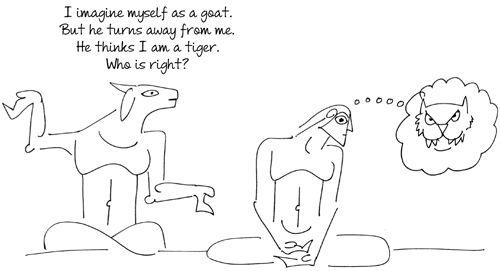Business Sutra: A Very Indian Approach to Management (46 page)
Read Business Sutra: A Very Indian Approach to Management Online
Authors: Devdutt Pattanaik

Surya then sought out his wife, and discovered she had taken the form of a mare. Instead of asking her to change back to human form, he turned into a horse and followed her to the pasture.
Yes, he could expect his wife to accept him as he was, or compel her to change for him, but that would mean he was incapable of growth. Reflecting on the other person's viewpoint prompts Surya to discover his ability to adapt, accommodate and grow. From god, he becomes animal and leads a happy life in the pasture until Saranya is able once more return to the sky by his side as his goddess.
This story reveals how the behaviour of people around us is a reaction to how they perceive us. If they fear us, they behave in a certain way. If they trust us, they behave differently. All behaviour depends on how other people perceive us. We can demand of others that they change their perceptions of us or we can decide to change ourselves and work on being more trustworthy. In the latter choice lies growth.
People often wonder why they are treated with respect in office and not the same way at home. It is usually an indicator of the power structures in the family and workplace. If we are feared in the family, everyone obeys us. If we are feared in the office, everyone tiptoes around us. If we are cruel to family members, it usually indicates that we feel they do not see us as we would wish to be seen or listen to us. The Other is always the mirror, the darpan, in which we can have a darshan of ourselves.

For two years, Sandesh had headed the operations department and put in place a whole set of systems and processes. With great difficulty, he had managed to get his team to align with the new environment and the results had been spectacular. Then Sandesh decided to spend more time on strategic thinking and appointed Ketan to handle the operations role. He just had to ensure the systems and processes set up over two years were being followed. But no sooner had Sandesh handed over the reins of the company than everything went awry. No one followed processes or systems and all reports came in late. Sandesh was angry with Ketan and his team for failing to do their jobs. Then he realized, the event revealed something about him. He had instituted the new processes by force of his personality. Alignment happened because people followed him, not the process. So when Ketan replaced him, everything collapsed. Ketan did not have the same force of personality as he did. No matter how much he blamed Ketan and his team, he was the source of the problem. Now, he had to go back to focusing on operations. But this time, like Surya, he had to change himself. Coach people to do the tasks not because he told them to, but because it was work that had to be done; in other words, take ownership. He also had to work with Ketan so that Ketan could take on the huge responsibility without feeling abandoned. By this singular shift in thinking, Sandesh had created a growth opportunity for himself.
The Other reveals the power of our gaze
Rishabh is a highly revered king who is invited by Indra to Amravati to attend a dance recital. It turns out to be an outstanding performance. Rishabh is enthralled by the skill of the dancer, but suddenly, in the middle of the performance, the dancer dies. Indra uses his magic power to make the dead dancer disappear and replaces her with another. It happens so fast that no one notices except Rishabh. It makes him wonder.
Why does Indra do what he does? Where does the need to hide the truth come from? Rishabh realizes that for all his outward pomp and glory, Indra imagines himself as prey. He needs to secure himself with this magic trick. Who does Indra imagine as his predator? Rishabh realizes that in Indra's eyes he is the tiger. This takes Rishabh by surprise, as he thinks of himself as a benevolent king. Is Rishabh's imagination of himself truer than Indra's imagination of him?
Indra's image of Rishabh is born out of fear. Maybe Rishabh, without realizing it, is contributing to Indra's fear. Rishabh comes across as self-righteous and noble, with clearly a higher level of ethics and morality than Indra, and this makes Indra insecure. Rishabh sees how imagination creates the jungle even when there is none. In the mind's eye, predators appear to be seeking prey, and alphas appear to be seeking domination.
This event transforms Rishabh into a tirthankar, for he sees clearly the violence of thoughts. He decides to renounce this violence and outgrow every underlying fear. He decides to spend his time observing the realm of thoughts so that he can understand and accommodate everyone he meets rather than trying to combat them. It is important to note that the event has no impact on Indra who stays the same.
Our presence impacts those around us. We may see them in one way. They see us in another. We may think we are helping while they think we are being patronizing. In each one's brahmanda, the Brahma is always right.

Ipsita notices that the way her secretary, Siddharth, speaks to her is very different from the way he speaks to the peons in office. In front of her, Siddharth is deferential and gentle whereas with the peons he is rude and imperious. Ipsita realizes that he sees her as alpha and respects her power. But he wants to position himself as alpha in front of the peons thus establishing a pecking order in the office. Ipsita has no desire to dominate Siddharth; she wants a transparent and professional relationship. But she cannot control Siddharth's worldview. Siddharth can turn the most professional workplace into a feudal order in no time. Upon introspection, Ipsita realizes that she does enjoy his deference to a degree. And by enjoying it she is contributing to the power equation. Now she realizes how expats who praise the equality in workplaces abroad, enjoy the servility of their team when they are posted to India. Unlike Rishabh, Ipsita enjoys being feared. It makes her feel powerful.
The Other reveals our insensitivity
In the Mahabharat, news reached King Virata of Matsya that his son, Uttar, had singlehandedly defeated the Kaurav army, pushing back great warriors like Karna and Duryodhan. The city prepared to welcome the young prince— the streets were watered, the buildings decorated with flowers, lamps and fluttering flags. King Virata's heart was filled with pride. His son had done the impossible. He ordered the poets to compose songs in Uttar's honour.
"But sir," said a priest standing next to Virata, "Does it not seem odd that a slip of a boy was able to defeat such mighty warriors? Surely he had help. Maybe that of his charioteer, Brihanalla, the eunuch, who once served Arjun, the great archer." The king ignored what the priest had to say and continued praising his son. Once again the priest said, "Surely sir, you do not believe he did it all alone. He must have had the support of another, perhaps Brihanalla, the eunuch, who once served Arjun, the great archer." Again the king ignored him and continued praising his son. When the priest suggested that the prince may have been helped by the eunuch-charioteer one more time, the king reacted violently. "Shut up!" he shouted, and slapped the priest so hard that his nose started to bleed.
The priest had been speaking the truth. Uttar was indeed helped by the eunuch-charioteer, Brihanalla, who was actually Arjun in disguise. But the king was not ready to hear the truth. He wanted to enjoy the alleged success of his son but the priest, in his relentless pursuit of correctness, did not appreciate a father's desire. The priest's truth was cold and insensitive. The king wanted compassion, at the cost of the truth, for some time at least.
The priest was Yudhishtir in disguise. This event takes place in the final year of exile of the Pandavs when they have to lose their identity and live incognito. The humiliation revealed to Yudhishtir the human desire for delusions and the importance of being gentle with the harsh truth. Yudhishtir was so caught up with his honesty that he did not realize the other's inability to receive it.
The ability to communicate with a king with deference and dexterity is known in Sanskrit as sabha-chaturya, which translated literally means 'tactfulness in court'. It is a trait that ministers and courtiers had to possess if they wished to survive in court and get their jobs done. It is a trait that people who work with leaders must possess. It is a trait that even leaders need to possess if they wish to lead.
The foundation for this skill lies in the observation that people are uncomfortable with the truth, especially when it shows them in a bad light or has consequences that could affect them adversely. When confronted with it, they react negatively—with rage or denial. They may get defensive or simply reject the submission. So the work does not get done. One needs strategic communication, also known as diplomacy. One needs sabha-chaturya.
Rathodji mastered the art of sabha-chaturya long ago. He knew his boss, Mr. Khilachand, was a brilliant man with a rags-to-riches story. He also knew his boss had an ego the size of a mountain. He refused to accept or admit a mistake. In fact, if a mistake was pointed out, he would do everything in his power to justify it. Mr. Khilachand was very fond of a distant cousin of his. So when a candidate presented himself before Mr. Khilachand with a recommendation from this cousin, he was, without much consideration, appointed manager in one of the many oil depots he owned. The candidate was a good-for-nothing layabout. He did no work and impeded the smooth running of operations. But no one dared complain to Mr. Khilachand. To do so would imply that Mr. Khilachand was a fool for having appointed a candidate purely on a recommendation, without checking credentials. And Mr. Khilachand did not appreciate being taken for a fool. In a rage, just to prove he was right—and everyone else who thought he was a fool was wrong—he could simply sack the person who had complained and give the incompetent candidate he had hired a raise or promotion. It was irrational, but that's the way he was. Rathodji knew this and so when the problem was presented to him, he pondered long and hard on how to give Mr. Khilachand the message without upsetting him and making matters worse.
The Other reveals our inadequacy
As Ravan lies mortally wounded on the battlefield and the monkeys are celebrating their victory, Ram turns to his brother, Lakshman, and tells him to learn whatever he can from the rakshasa-king who is a renowned scholar. Lakshman obeys but returns soon after saying the arrogant Ravan turned his face away when asked to share his knowledge.
Ram looks at his brother and asks him, "Where did you stand while asking him for knowledge?" Lakshman replies, "Next to his head so that I could hear what he had to say clearly." Ram smiles, places his bow on the ground and walks over to where Ravan lies and, to Lakshman's astonishment, kneels at Ravan's feet.
With palms joined in extreme humility, Ram says, "Lord of Lanka, you abducted my wife, a terrible crime for which I have been forced to punish you. Now, you are no more my enemy. I bow to you and request you to share your knowledge with me."
To Lakshman's greater astonishment, Ravan opens his eyes and raises his arms to salute Ram. "If only I had more time as your teacher than as your enemy. Standing at my feet as a student, unlike your rude younger brother, you are a worthy recipient of my knowledge." Ravan then shared his vast knowledge and died.
Despite having fought against Ravan for as long as Ram did, Lakshman never saw Ravan for who he was. He did not see Ravan's desire to dominate everyone around him. He did not see what made Ravan cling to Sita even when the army of monkeys killed his brothers, his sons, his subjects, and threatened his city. Would such a man share his knowledge freely? Ram can see Ravan's need to dominate even as he is dying. That is what stops Ravan from being unconditionally generous with his knowledge. So Ram indulges the rakshasa-king, grants him the power he so desperate needs in svaha and receives Ravan's knowledge as tathastu.
